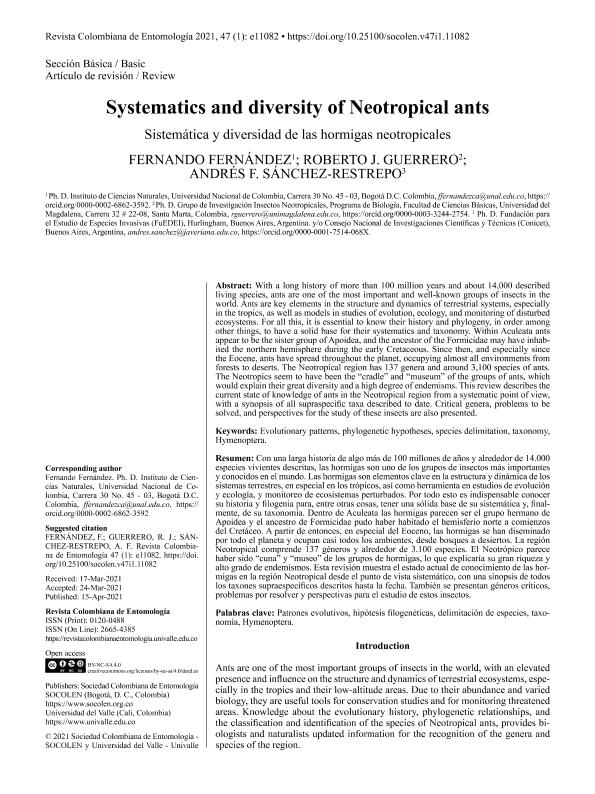Mostrar el registro sencillo del ítem
dc.contributor.author
Fernandez, Fernando
dc.contributor.author
Guerrero, Roberto Ariel

dc.contributor.author
Sánchez Restrepo, Andrés Fernando

dc.date.available
2022-08-11T15:55:02Z
dc.date.issued
2021-04
dc.identifier.citation
Fernandez, Fernando; Guerrero, Roberto Ariel; Sánchez Restrepo, Andrés Fernando; Systematics and diversity of Neotropical ants; Sociedad Colombiana de Entomología; Universidad del Valle; Revista Colombiana de Entomología; 47; 1; 4-2021; 1-20
dc.identifier.issn
0120-0488
dc.identifier.uri
http://hdl.handle.net/11336/165214
dc.description.abstract
With a long history of more than 100 million years and about 14,000 described living species, ants are one of the most important and well-known groups of insects in the world. Ants are key elements in the structure and dynamics of terrestrial systems, especially in the tropics, as well as models in studies of evolution, ecology, and monitoring of disturbed ecosystems. For all this, it is essential to know their history and phylogeny, in order among other things, to have a solid base for their systematics and taxonomy. Within Aculeata ants appear to be the sister group of Apoidea, and the ancestor of the Formicidae may have inhabited the northern hemisphere during the early Cretaceous. Since then, and especially since the Eocene, ants have spread throughout the planet, occupying almost all environments from forests to deserts. The Neotropical region has 137 genera and around 3,100 species of ants. The Neotropics seem to have been the “cradle” and “museum” of the groups of ants, which would explain their great diversity and a high degree of endemisms. This review describes the current state of knowledge of ants in the Neotropical region from a systematic point of view, with a synopsis of all supraspecific taxa described to date. Critical genera, problems to be solved, and perspectives for the study of these insects are also presented.
dc.description.abstract
With a long history of more than 100 million years and about 14,000 described living species, ants are one of the most important and well-known groups of insects in the world. Ants are key elements in the structure and dynamics of terrestrial systems, especially in the tropics, as well as models in studies of evolution, ecology, and monitoring of disturbed ecosystems. For all this, it is essential to know their history and phylogeny, in order among other things, to have a solid base for their systematics and taxonomy. Within Aculeata ants appear to be the sister group of Apoidea, and the ancestor of the Formicidae may have inhabited the northern hemisphere during the early Cretaceous. Since then, and especially since the Eocene, ants have spread throughout the planet, occupying almost all environments from forests to deserts. The Neotropical region has 137 genera and around 3,100 species of ants. The Neotropics seem to have been the “cradle” and “museum” of the groups of ants, which would explain their great diversity and a high degree of endemisms. This review describes the current state of knowledge of ants in the Neotropical region from a systematic point of view, with a synopsis of all supraspecific taxa described to date. Critical genera, problems to be solved, and perspectives for the study of these insects are also presented.
dc.format
application/pdf
dc.language.iso
eng
dc.publisher
Sociedad Colombiana de Entomología; Universidad del Valle
dc.rights
info:eu-repo/semantics/openAccess
dc.rights.uri
https://creativecommons.org/licenses/by-nc-sa/2.5/ar/
dc.subject
EVOLUTIONARY PATTERNS
dc.subject
HYMENOPTERA
dc.subject
PHYLOGENETIC HYPOTHESES
dc.subject
SPECIES DELIMITATION
dc.subject
TAXONOMY
dc.subject.classification
Zoología, Ornitología, Entomología, Etología

dc.subject.classification
Ciencias Biológicas

dc.subject.classification
CIENCIAS NATURALES Y EXACTAS

dc.title
Systematics and diversity of Neotropical ants
dc.title
Sistemática y diversidad de las hormigas neotropicales
dc.type
info:eu-repo/semantics/article
dc.type
info:ar-repo/semantics/artículo
dc.type
info:eu-repo/semantics/publishedVersion
dc.date.updated
2022-08-11T13:07:14Z
dc.identifier.eissn
2665-4385
dc.journal.volume
47
dc.journal.number
1
dc.journal.pagination
1-20
dc.journal.pais
Colombia

dc.journal.ciudad
Bogotá
dc.description.fil
Fil: Fernandez, Fernando. Universidad Nacional de Colombia; Colombia
dc.description.fil
Fil: Guerrero, Roberto Ariel. Universidad del Magdalena; Colombia
dc.description.fil
Fil: Sánchez Restrepo, Andrés Fernando. Consejo Nacional de Investigaciones Científicas y Técnicas; Argentina. Fundación para el Estudio de Especies Invasivas; Argentina
dc.journal.title
Revista Colombiana de Entomología

dc.relation.alternativeid
info:eu-repo/semantics/altIdentifier/url/https://revistacolombianaentomologia.univalle.edu.co/index.php/SOCOLEN/article/view/11082
dc.relation.alternativeid
info:eu-repo/semantics/altIdentifier/doi/http://dx.doi.org/10.25100/socolen.v47i1.11082
Archivos asociados
